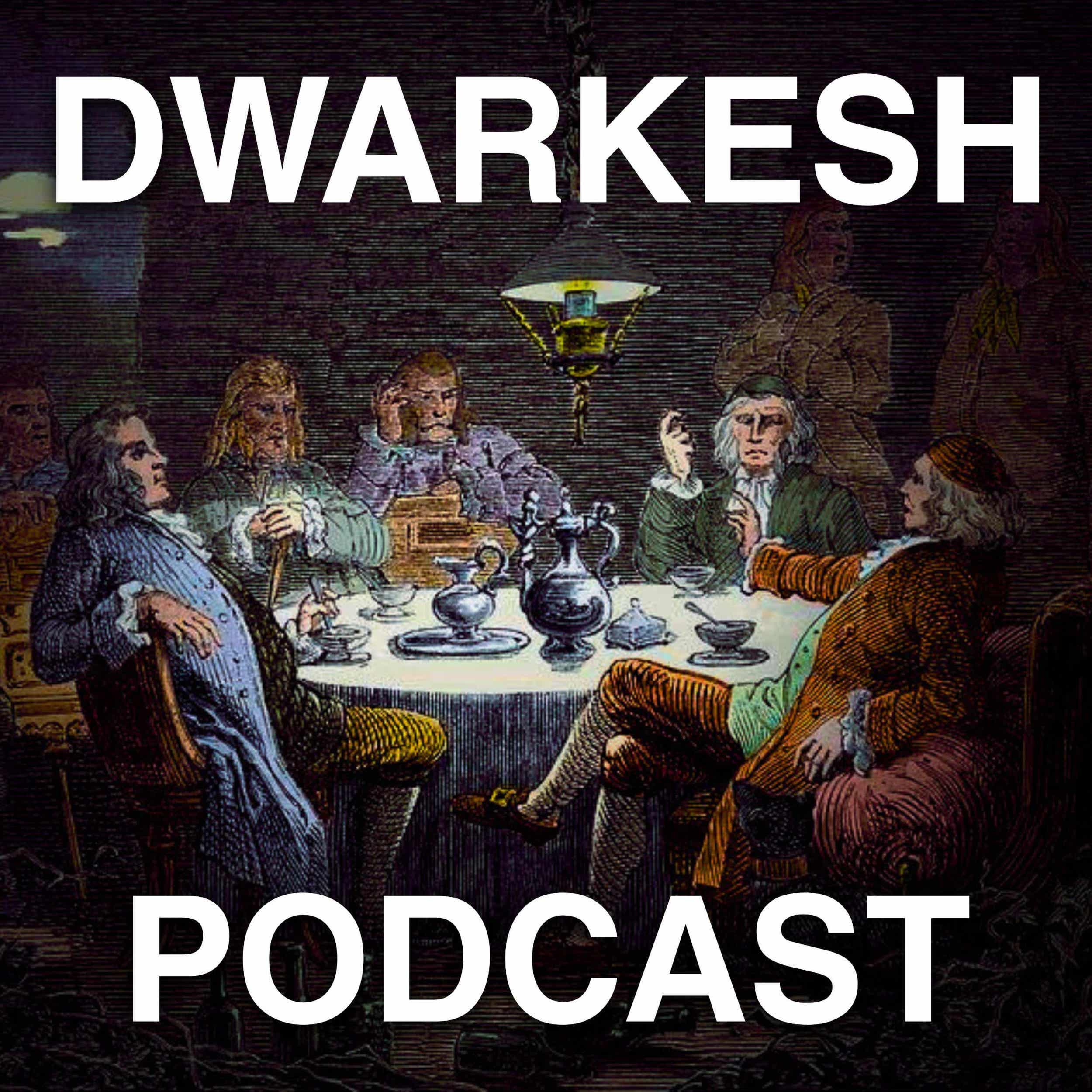

Dwarkesh Podcast
Dwarkesh Patel
Deeply researched interviews www.dwarkesh.com
Episodes
Mentioned books

2,909 snips
Feb 13, 2026 • 2h 22min
Dario Amodei — "We are near the end of the exponential"
Dario Amodei, AI researcher and CEO of Anthropic, renowned for work on large-scale models and AI risk. He discusses why scaling and task-specific RL may generalize, how AI could diffuse through the economy, timelines for near-AGI-like capabilities, Anthropic’s compute and profitability choices, and governance and geopolitical risks tied to powerful models.

3,260 snips
Feb 5, 2026 • 2h 50min
Elon Musk — "In 36 months, the cheapest place to put AI will be space”
Elon Musk, entrepreneur and CEO of SpaceX and Tesla, leading large-scale projects in space, energy and AI. He discusses why space could become the cheapest place for AI within 36 months. He explains power limits on Earth and scaling solar and launches. He covers scaling humanoid robots, xAI’s approach to alignment and business, and chip and memory bottlenecks for massive compute.

1,586 snips
Dec 30, 2025 • 1h 50min
Adam Marblestone — AI is missing something fundamental about the brain
Adam Marblestone, CEO of Convergent Research and former Google DeepMind scientist, delves into the fascinating intersection of neuroscience and AI. He explains how the brain learns efficiently from minimal data and argues that the secret lies in complex reward functions shaped by evolution. Marblestone highlights how the brain’s predictive cortex contrasts with AI's next-token predictions, and discusses the cellular diversity linked to specific behaviors. The conversation also touches on the implications of this understanding for improving AI systems, including using insights from AI to unlock neural mechanisms.

1,268 snips
Dec 23, 2025 • 12min
An audio version of my blog post, Thoughts on AI progress (Dec 2025)
The discussion delves into the complexities of AI progress and the limitations of current robotics. It highlights skepticism around automated researchers and the challenges of achieving human-like continual learning. The concept of scaling in reinforcement learning is examined, alongside the significant compute needs for advancements. Predictions for the future include the potential for brain-like intelligences and the need for efficient training methods. Lastly, the importance of competition in driving innovation is emphasized.

1,099 snips
Dec 19, 2025 • 1h 55min
Sarah Paine — Why Russia Lost the Cold War
Sarah Paine, a political scientist and historian specializing in Russian affairs, discusses the multifaceted reasons behind the Soviet Union’s collapse. She explores Reagan's military strategies, the impact of the Helsinki Accords on Eastern Bloc dissidents, and the Sino-Soviet split. Paine highlights internal issues like economic failures and political reforms under Gorbachev. She also delves into Boris Yeltsin's pivotal role in the dissolution of the USSR. With a nod to current geopolitical tensions, she offers insights on navigating potential new conflicts.

5,812 snips
Nov 25, 2025 • 1h 36min
Ilya Sutskever — We're moving from the age of scaling to the age of research
Join Ilya Sutskever, co-founder of OpenAI and Stability AI, as he dives into the world of AI and machine learning. He discusses the intriguing concept of model jaggedness, explaining why AI sometimes behaves inconsistently. Ilya contrasts pre-training and reinforcement learning, emphasizing the importance of generalization and the barriers faced by AI. He also explores how emotions can serve as value functions and proposes new strategies for ensuring AGI is aligned with human values. Insights on continual learning and the future of superintelligence add depth to this fascinating conversation.

3,323 snips
Nov 12, 2025 • 1h 28min
Satya Nadella — How Microsoft is preparing for AGI
Satya Nadella, CEO of Microsoft, shares insights on the groundbreaking Fairwater 2 datacenter, capable of massive AI training jobs. He discusses how Microsoft is adapting its business models for AGI, emphasizing AI's transformative potential and sustainable growth. Nadella highlights innovations like GitHub Copilot, the importance of data diversity, and the balance between research and product development. Dylan Patel, founder of SemiAnalysis, probes into Microsoft's hyperscale strategy, custom silicon plans, and the significance of trust in cloud commitments.

938 snips
Oct 31, 2025 • 1h 31min
Sarah Paine — How Russia sabotaged China's rise
In a riveting discussion, military historian Sarah Paine delves into how Stalin's machinations significantly hindered China's rise for over a century. She explores the complexities of Russo-Chinese relations, detailing how Soviet interventions delayed China's control over crucial territories like Manchuria. Paine explains the impact of the Sino-Soviet split and draws parallels between historical dynamics and current events, including Chinese support for Russia in Ukraine. Her insights offer a fresh perspective on the geopolitical chessboard of the past and present.

10,220 snips
Oct 17, 2025 • 2h 25min
Andrej Karpathy — AGI is still a decade away
Andrej Karpathy, a leading AI researcher and former Tesla Autopilot head, shares insights on the future of artificial general intelligence (AGI) and education. He discusses why AGI will likely take another decade to mature, highlighting the inefficiencies of reinforcement learning compared to other methods. He critiques the slow progress of self-driving technology, attributing it to safety requirements. Karpathy also emphasizes the importance of integrating AI into education, proposing a model that combines expert faculty and AI assistance for personalized learning.

1,602 snips
Oct 10, 2025 • 1h 20min
Nick Lane – Life as we know it is chemically inevitable
In this conversation, Nick Lane, an evolutionary biochemist at University College London, dives into the origins of life and the role of eukaryotes. He suggests that early life may have emerged from hydrothermal vents, explaining why life relies on proton gradients and why complex cells evolved only once. Lane discusses how two sexes evolved for mitochondrial quality control and how early life’s chemistry implies its prevalence across the galaxy. He connects these theories to the large-scale patterns seen in eukaryotic evolution and challenges listeners to embrace scientific curiosity.


